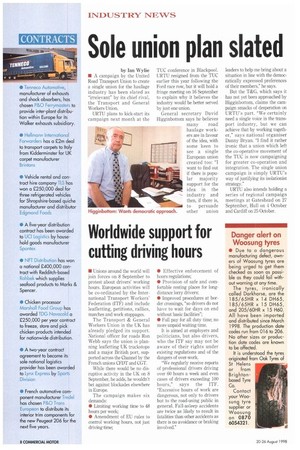Worldwide support for cutting driving hours
Page 10

If you've noticed an error in this article please click here to report it so we can fix it.
• Unions around the world will join forces on 8 September to protest about drivers' working hours. European activities will be co-ordinated by the International Transport Workers' Federation (ITF) and include leafletting, petitions, rallies, marches and work stoppages.
The Transport & General Workers Union in the UK has already pledged its support. National officer for roads Ron Webb says the union is planning leafletting UK truckstops and a major British port, supported across the Channel by the French unions CFDT and CGT.
While there would be no disruptive activity in the UK on 8 September, he adds, he wouldn't bet against blockades elsewhere in Europe.
The campaign makes six demands: • Limiting working time to 48 hours per week; • Amendment of EU rules to control working hours, not just driving time; • Effective enforcement of hours regulations;
• Provision of safe and corn fortable resting places for longdistance lorry drivers;
• Improved procedures at border crossings, "so drivers do not have to wait for days on end without basic facilities"; • Full pay for all duty time; no more unpaid waiting time.
It is aimed at employers and politicians, but also drivers, who the ITF say may not be aware of their rights under existing regulations and of the dangers of over-work.
"We regularly receive reports of professional drivers driving over 60 hours a week and even cases of drivers exceeding 100 hours," says the ITF. "Excessive hours of work are dangerous, not only to drivers but to the road-using public in general. Fall-asleep accidents are twice as likely to result in fatalities than other accidents as there is no avoidance or braking involved."








































































































